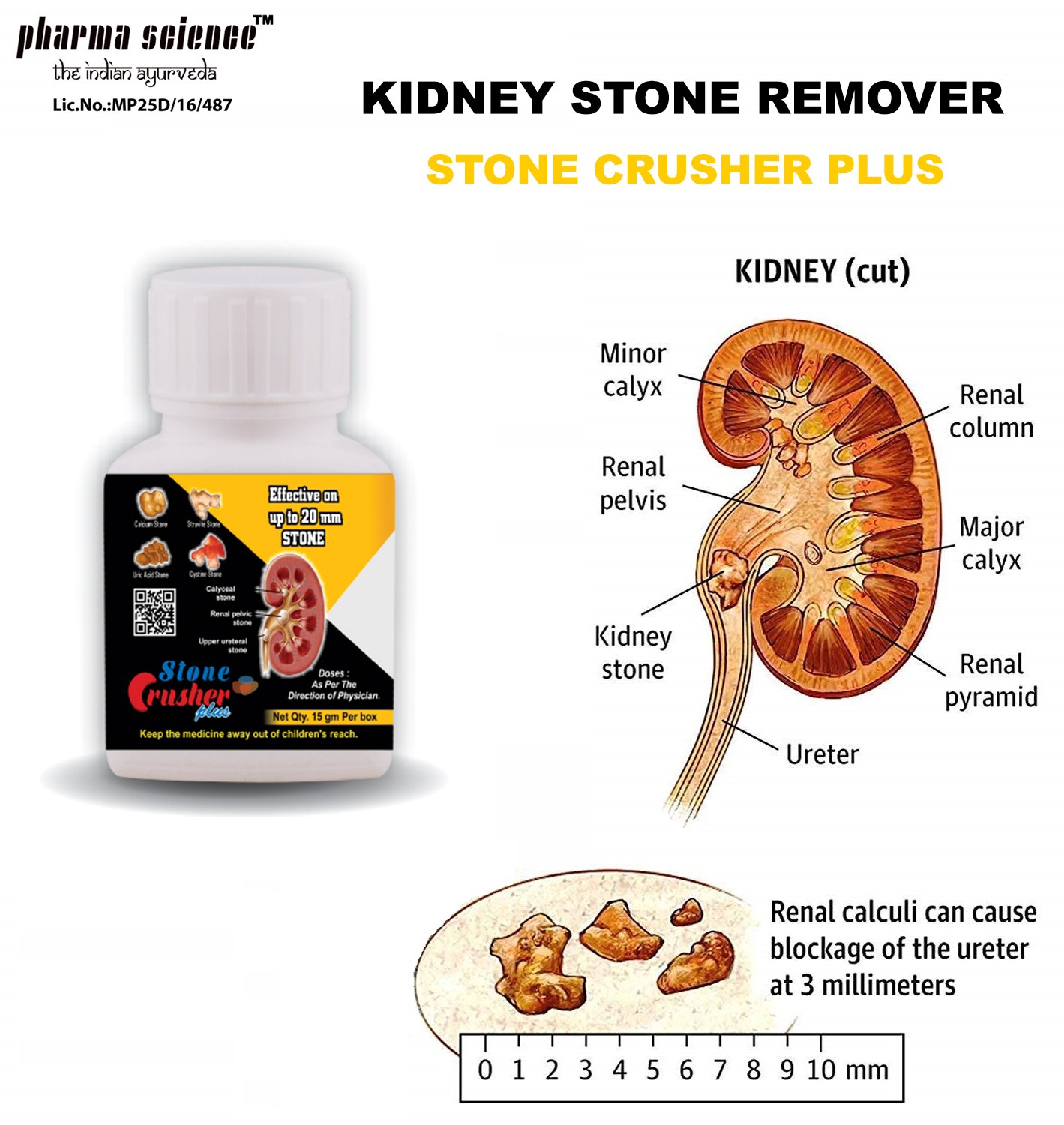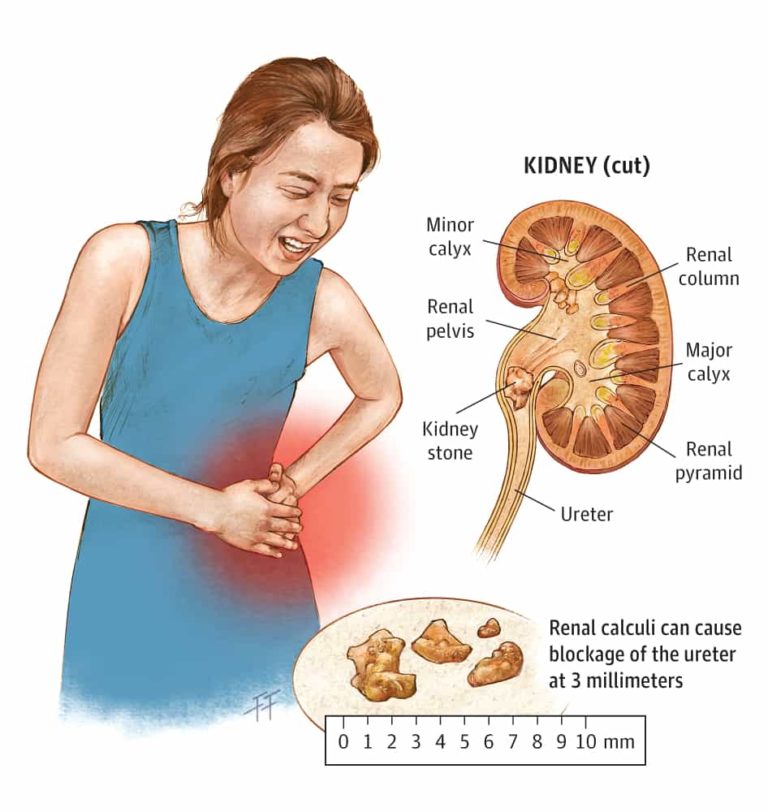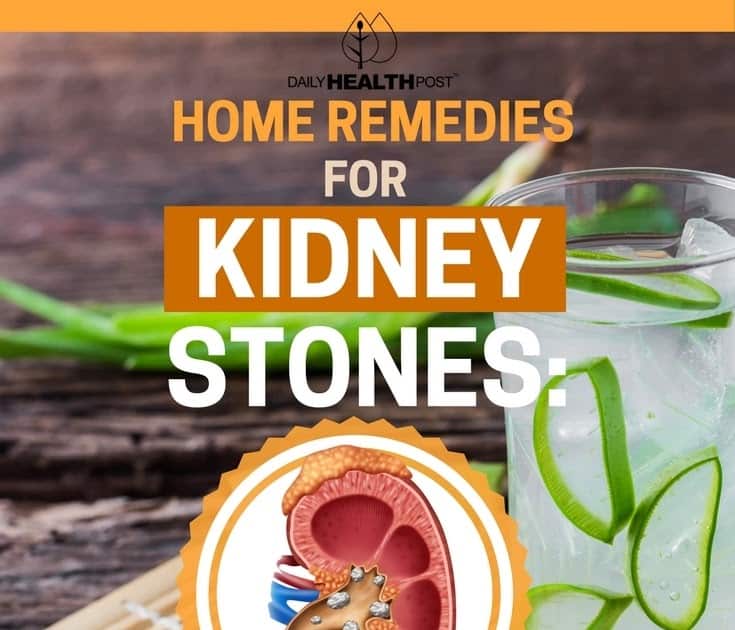What Are The Types Of Kidney Stones
There are four types of kidney stones:
Calcium stones
Calcium stones are the most common type of kidney stones. They form when calcium mixes with oxalate in your urine. These form when you are not getting enough fluids or calcium.
Uric stones
Uric stones are also a common type of kidney stone. High levels of a natural chemical called purine in your body can cause a high level of a chemical called urate that can create these kidney stones. This type of kidney stone tends to run in families.
Struvite stones
Struvite stones are less common than calcium and uric stones. Struvite stones can happen when bacteria from upper urinary tract infections get into your urinary tract.
Cystine stones
Cystine stones are caused by a rare condition called cystinuria that is passed down in families. Cystinuria causes a natural chemical called cystine to leak into your urine. When there is too much cystine in your urine, kidney stones can form. These stones can get stuck in your kidneys, bladder or anywhere in your urinary tract. Most people with cystinuria will get many stones in their life. It is a lifelong condition that can be treated but not cured.
Avoiding Recurrence Of Kidney Stones
If you have had one kidney stone, some tips that may help to prevent a second stone forming include:
- Talk to your doctor about the cause of the previous stone.
- Ask your doctor to check whether the medications you are on could be causing your stones. Do not stop your medications without talking to your doctor.
- Get quick and proper treatment of urinary infections.
- Avoid dehydration. Drink enough fluids to keep your urine volume at or above two litres a day. This can halve your risk of getting a second stone by lowering the concentration of stone-forming chemicals in your urine.
- Avoid drinking too much tea or coffee. Juices may reduce the risk of some stones, particularly orange, grapefruit and cranberry. Ask your doctor for advice.
- Reduce your salt intake to lower the risk of calcium-containing stones. Dont add salt while cooking and leave the saltshaker off the table. Choose low- or no-salt processed foods.
- Avoid drinking more than one litre per week of drinks that contain phosphoric acid, which is used to flavour carbonated drinks such as cola and beer.
- Always talk to your doctor before making changes to your diet.
Drinking mineral water is fine it cannot cause kidney stones because it contains only trace elements of minerals.
Relieving Kidney Pain At Home Urinary Infections
If youre suffering from kidney pain due to an infection in the urinary tract, try the following remedies. If they dont work, make sure to schedule a visit with your urologist to discuss a treatment plan that will ensure the infection doesnt spread.
Hydration is key to flushing out infections of the urinary tract. Not only will staying hydrated help eliminate bacteria, it can relieve pain by reducing the concentration of your urine. Instead of turning to sugary drinks, increase your water intake. Water is always a better option as it causes less irritation. As a general rule of thumb, aim for 8, 8oz glasses a day.2 If youre active or have a strenuous lifestyle you may need more water to stay hydrated.
Probiotics help fight bacteria build-up in your gut and replaces it with good, immune boosting bacteria.3 Regularly taking probiotics may also help your kidney process waste, thus making treatments more effective.3
UTIs are oftentimes associated with cranberry juice and for good reasonit helps alleviate pain. Avoid overly processed cranberry juice cocktails and instead, opt for pure juice or some sort of supplement to help mitigate kidney pain and reduce the symptoms of a UTI.
If the bath doesnt help, try adding direct heat with a heating pad or a heated water bottle. Place it on the affected area for about 20 minutes at a time to help reduce pain.2
Read Also: Are Bcaa Bad For Kidneys
Use Your Health Insurance Just Like You Normally Would To See Your Doctor
During your UTI treatment, you can take steps to ensure that you get the maximum effect out of your antibiotics while promoting your own comfort.
- Use a heating pad on your abdomen to soothe any pain and discomfort and relieve pressure.
- Drink plenty of water to help flush out the bacteria in your urinary tract.
- Avoid any food and drink that may irritate your urinary system. This includes coffee, alcohol, and sugary sodas that contain citrus juice or caffeine.
Recommended Reading: What Do They Do For A Kidney Infection
How To Get Relief From Kidney Stone Pain

When pain does occur, it can be so severe that many patients have to go to the closest emergency room to seek immediate treatment. Often a single dose of pain medication given by an ER doctor is enough to alleviate the pain for a prolonged period of time, allowing the stone to pass, says Lieske.
While narcotic pain medications can be carefully given for this purpose, studies suggest that nonsteroidal anti-inflammatory drugs milder pain medications with fewer side effects can be just as effective. A 2018 review of 36 clinical trials that compared NSAIDs with stronger pain medications for kidney stone pain relief found that NSAIDs were equivalent when it came to pain reduction and led to fewer side effects. 30977-6/fulltext rel=nofollow> 7)
Tamsulosin , a type of medication known as an alpha-blocker, is also widely used to help relax the muscles of the ureter, increasing the chance of passing the stone and helping reduce symptoms of pain, Bechis notes. Although some evidence suggests this medication may not add as much benefit as previously thought, he adds. A 2015 study found that tamsulosin didnt help stones pass. 60933-3/fulltext rel=nofollow> 8) However, a 2018 study of more than 3,000 participants did find that those who took tamsulosin passed stones more quickly and required less pain relief medicine than those who took a placebo.
How long does kidney stone pain last? It depends on how long it takes to pass the stone.
Recommended Reading: Is Zinc Bad For Your Kidneys
What Are Kidney Stones
Also known as renal stones or nephrolithiasis, kidney stones are composed of hard, solid waste materials that build up in the kidneys and form crystals.
Four main types exist, but about 80% of all stones are calcium oxalate stones. Less common forms include struvite, uric acid, and cysteine .
While smaller stones are usually not a problem, larger stones may cause a blockage in part of your urinary system as they leave your body.
This can lead to severe pain, vomiting, and bleeding.
Kidney stones are a common health problem. In fact, about 12% of men and 5% of women in the United States will develop a kidney stone during their lifetime .
Whats more, if you get a kidney stone once, studies suggest you are up to 50% more likely to form another stone within 5 to 10 years (
Below are 8 natural ways you can reduce the risk of forming another kidney stone.
Summary Kidney stones are firm lumps formed from crystallized waste products in the kidneys. They are a common health problem and passing large stones can be very painful.
Consume Apples And Apple Juice
Apples are also nutrient-dense. Their high acid content may help the kidneys to maintain acidity in the urine, possibly inhibiting further growth of bacteria. They also have anti-inflammatory properties, which may be beneficial in helping the kidneys to heal following the infection. Learn more about the many health benefits of apples.
You May Like: Reducose Weight Loss
Recommended Reading: Does Beer Help Pass Kidney Stones
Prescription Medication For Severe Pain
If the stone is causing severe pain, the urologist may choose to prescribe a narcotic. Providers may also inject patients with Ketorolac , a more powerful anti-inflammatory medication. If the patient becomes severely dehydrated due to vomiting or the inability to drink enough liquids, the urologist may decide to give IV fluids and pain medications.
How Are Kidney Stones Diagnosed
Your healthcare provider will discuss your medical history and possibly order some tests. These tests include:
- Imaging tests: An X-ray, CT scan and ultrasound will help your healthcare provider see the size, shape, location and number of your kidney stones. These tests help your provider decide what treatment you need.
- Blood test: A blood test will reveal how well your kidneys are functioning, check for infection and look for biochemical problems that may lead to kidney stones.
- Urine test: This test also looks for signs of infection and examines the levels of the substances that form kidney stones.
Recommended Reading: How Do Kidneys Regulate Acid Base Balance
Should I Cut Calcium Out Of My Diet If I Develop Calcium Oxalate Kidney Stones
If you develop kidney stones composed of calcium, you may be tempted to stop eating foods that include calcium. However, this is the opposite of what you should do. If you have calcium oxalate stones, the most common type, its recommended that you have a diet higher in calcium and lower in oxalate.
Foods that are high in calcium include:
Its also important to drink plenty of fluids to dilute the substances in your urine.
Causes Of Kidney Infections
A kidney infection happens when bacteria infects your kidneys. The bacteria are usually a type called E. coli, which live in your bowel.
The bacteria get in through the opening of the urethra and move upwards through your urinary tract, first infecting your bladder and then your kidneys.
In rare cases, a kidney infection can develop if bacteria or fungi infect the skin and the infection spreads through your bloodstream into your kidney. However, this type of infection usually only occurs in people with weakened immune systems.
Read Also: How To Get Rid Of Kidney Stones At Home
What Are The Symptoms Of Analgesic Nephropathy
These are the most common symptoms of analgesic nephropathy:
- Fatigue or weakness, feeling unwell
- Blood in the urine
- Widespread swelling
- Easy bruising or bleeding
Some people have no symptoms. Kidney damage may be picked up by routine blood tests. The symptoms of analgesic nephropathy may look like other medical conditions or problems. Always talk with your healthcare provider for a diagnosis.
Dont Miss: How Do You Know If You Are Having Kidney Issues
Causes Of Kidney Stones

Kidney stones are most likely to occur in people between the ages of 20 and 50.
Different factors can increase your risk of developing a stone. In the United States, white people are more likely to have kidney stones than Black people.
Sex also plays a role. More men than women develop kidney stones, according to the .
A history of kidney stones can increase your risk. So does a family history of kidney stones.
Other risk factors include:
narcotic medications. The presence of infection requires treatment with antibiotics. Other medications include:
- allopurinol for uric acid stones
- thiazide diuretics to prevent calcium stones from forming
- sodium bicarbonate or sodium citrate to make the urine less acidic
- phosphorus solutions to prevent calcium stones from forming
Don’t Miss: How To Take Care Kidney Problems
Menstruation And Pain In The Kidney
Female reproductive system does not work autonomously. Its functioning depends on other organs. The urinary system adjacent to the uterus and appendages can have a noticeable effect on them. Kidneys and menses are interdependent, so problems with these organs change the nature and time of critical days.
Read in this article.
You May Like: Can Tums Cause Kidney Stones
What Is Shock Wave Lithotripsy
Shock Wave Lithotripsy is the most common treatment for kidney stones in the U.S. Shock waves from outside the body are targeted at a kidney stone causing the stone to fragment. The stones are broken into tiny pieces. lt is sometimes called ESWL: Extracorporeal Shock Wave Lithotripsy®.
These are what the words mean:
- extracorporeal: from outside the body
- shock waves: pressure waves
So, SWL describes a nonsurgical technique for treating stones in the kidney or ureter using high-energy shock waves. Stones are broken into stone dust or fragments that are small enough to pass in urine. lf large pieces remain, another treatment can be performed
Also Check: How To Ease Kidney Infection Symptoms
Don’t Miss: What Do Small Kidney Stones Look Like
Types Of Kidney Stones
Kidney stonesvary in composition depending on the type of minerals in the urine:
- Calcium forms about 80 percent of kidney stones mostly calcium oxalate and, in some cases, calcium phosphate.
- Uric acid crystals tend to form stones in acidic urine. The following contribute to acidic urine: excess weight, chronic diarrhea, type 2 diabetes, gout and diets high in protein and low in fruits and vegetables.
- Struvite forms in alkaline urine, often related to chronic urinary tract infections.
- Cystine is an amino acid that forms stones when in high concentration, due to a rare inherited condition. This is the rarest form of kidney stones.
Stones that form in your kidneys are not the same as bladder stones. Bladder stones develop in different ways. But small kidney stones may travel down the ureters into your bladder and, if not expelled, can grow into bladder stones.
The most common cause of kidney stones is dehydration. Youre not drinking enough water to dilute the concentration of minerals in your urine.
You May Like: Is Red Wine Bad For Kidney Stones
Removing Stones Through An Endoscopic Procedure
There are two common methods for removing stones through a surgical procedure: ureterorenoscopy and percutaneous nephrolithotripsy .
- Ureterorenoscopy : In this method, tiny instruments are moved through the urethra and bladder with the help of an , and pushed up into the ureter where the stone is. There the stone is either broken up mechanically or using a laser so that the pieces can be flushed out in the urine or removed using the endoscope. URS is used for stones that are bigger than 10 millimeters in diameter and are in the middle or lower third of the ureter. Kidney stones up to 20 millimeters in diameter are often removed using URS.
- Percutaneous nephrolithotripsy : In this method, an is moved into the renal pelvis or the kidney through a small cut made on your back. There the stones can also be either broken up mechanically or with a laser. Tiny forceps are used to remove the pieces of the kidney stones. This method is mainly used to treat kidney stones greater than 10 millimeters in diameter.
General anesthesia and a short hospital stay are necessary for both of these approaches.
Nowadays, more major surgery is only very rarely needed to remove kidney stones.
You May Like: Does Bactrim Help With Kidney Infection
Milk Causes Kidney Stones Because Of The Calcium
MYTH BUSTED: Milk Really does a body good. Calcium is your friend, so drink on. The fact is one-way kidney stones are actually caused is a LACK of calcium. You should have a glass of milk at least once a day or yogurt. Try to also consume more magnesium as this binds oxalate which will help in kidney stone prevention. And no kids, this isnt an excuse to have chocolate milk for dinner, but thanks for playing.
Recommended Reading: What Is The Best Description Of Chronic Kidney Disease
Why Do I Feel Pain In My Right Kidney
If you have pain in the area of your right kidney, it could be caused by a relatively common kidney problem, such as a urinary tract infection or kidney stone. Pain in the area of your right kidney might also be caused by a more uncommon condition such as renal vein thrombosis or polycystic kidney disease .
Also Check: Does Carbonation Cause Kidney Stones
Also Check: Can Kidney Stones Affect Fertility
Medication For Kidney Stones
For most people with recurrent calcium stones, a combination of drinking enough fluids, avoiding urinary infections, and specific treatment with medications will significantly reduce or stop new stone formation.
Certain medications such as thiazide diuretics or indapamide reduce calcium excretion and decrease the chance of another calcium stone. Potassium citrate or citric juices are used to supplement thiazide treatment and are used by themselves for some conditions where the urine is too acidic.
For people who have a high level of uric acid in their urine, or who make uric acid stones, the medication allopurinol will usually stop the formation of new stones.
Quick Read Yes Women Can Get Kidney Stones

- Kidney stones are being diagnosed in women at increasing rates.
- Obesity, diabetes and associated conditions increase kidney stone risk in women.
- Other risk factors include climate change and hot, dry climates.
While youve likely heard of kidney stones , theres a lot of misconceptions about these pebble-like deposits.
Kidney stones are hard formations that develop in your kidneys when there is a high concentration of substances like calcium, oxalate, uric acid and phosphorus in your urine. They can vary in color, density, location and shape, and range in size from as small as a grain of sand to, in rare cases, as large as a spikey golf ball.
Perhaps the most common misconception is that kidney stones only happen to men, but this is simply not true. Around 11% of men and 6% of women are diagnosed with kidney stones in their lifetime, and this gender gap is closing as women are diagnosed at increasing rates.
While some of this is likely due to improved sensitivity of imaging even tiny, symptom-free stones can be seen with todays advanced technology much of the increase can likely be attributed to common health-related challenges: our ongoing obesity epidemic and the health challenges posed by our diets and sedentary lifestyles.
Recommended Reading: How Long Does Kidney Failure Take